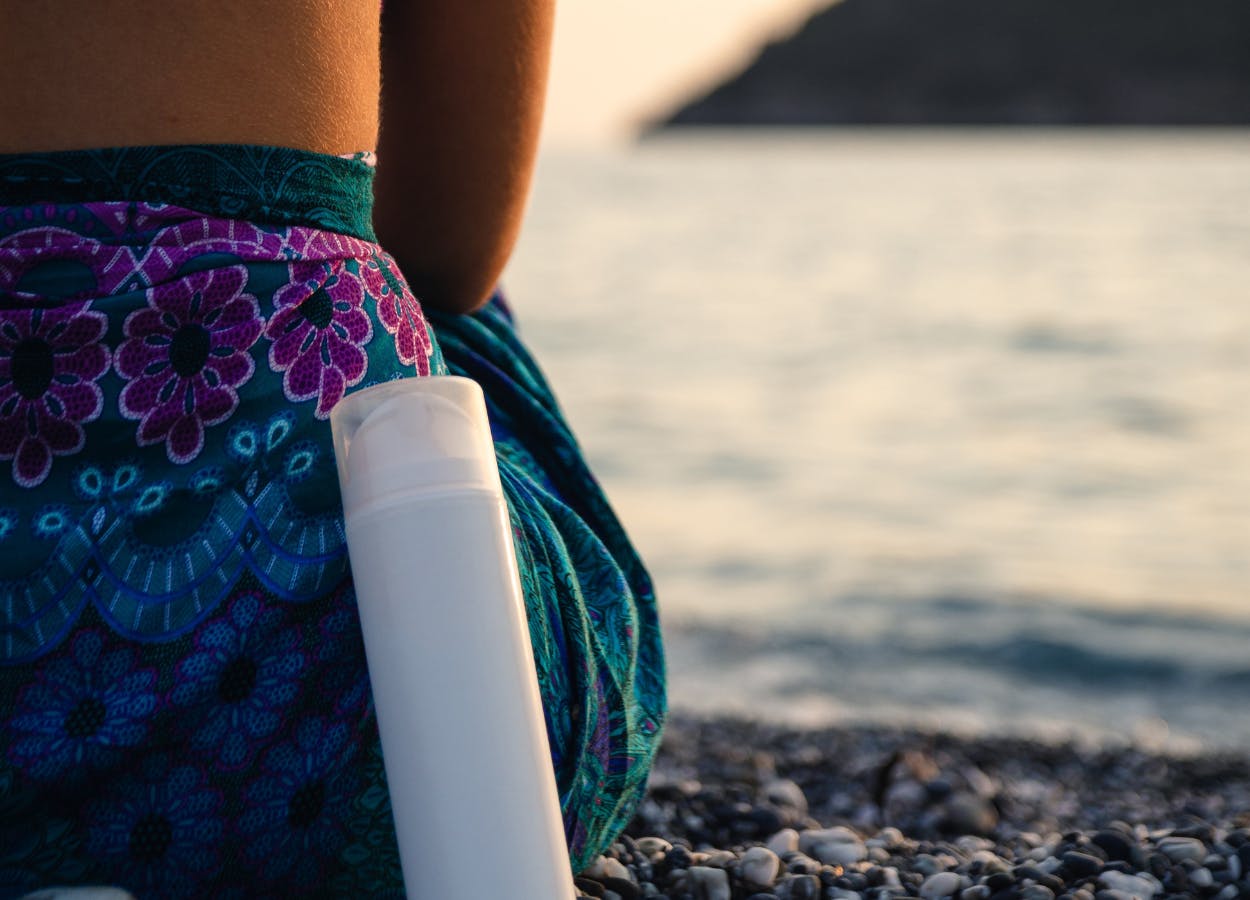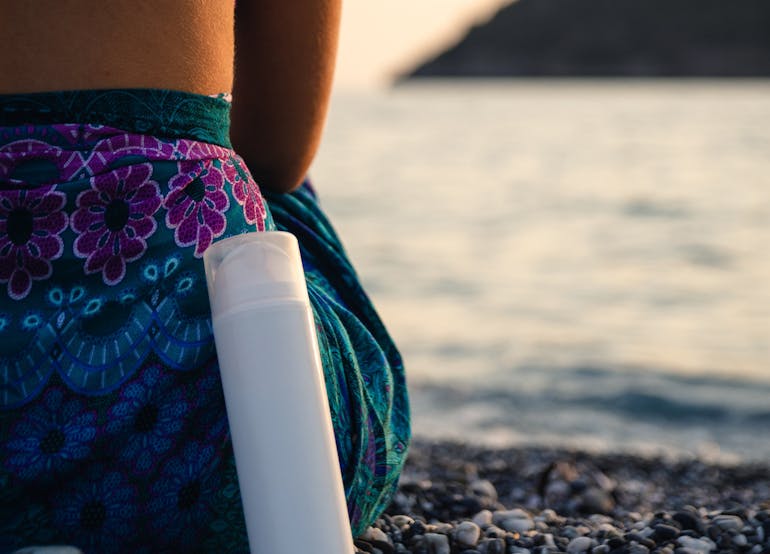(How to) Wear Sunscreen: your ultimate guide
Reviewed and fact-checked by Giulia Guerrini, Superintendent Pharmacist. Read our editorial policy to see how we create informative, accurate content.
There are few things better than kicking back on a sun lounger and soaking up some sun next to a pool or on a beach, if you ask us. It soothes the soul after long, wet winter months – but, we’ll be honest, it doesn’t always soothe the skin. Like the famous (for good reason) Baz Luhrmann track says, we’ve got one big tip for that: 'Wear Sunscreen.'
Now we know this isn’t news to you, but with so much choice, it can be difficult to make the right decision when buying the best sunscreen for you. We’ve put together this ultimate guide to sunscreen so you have all the information you need to make the best choices – even when buying sunscreen for kids.
- How does sunscreen work?
- What are the different types of sunscreen?
- Should you wear sunscreen every day?
- How often should you apply sunscreen?
- What do the SPF numbers mean?
- Does sunscreen stop you from tanning?
- Does sunscreen block vitamin D?
- Does sunscreen expire?
- Which sunscreen should you choose for your skin type?
- How to apply sunscreen

_1._how_does_sunscreen_work?"> 1. How does sunscreen work?
What you probably already know is that sunscreen works by protecting your skin from the sun’s UV rays, like a fantastic personal sun-shield. Sunscreen does this by reflecting or absorbing UV rays with a combination of physical and chemical particles, depending on the sunscreen you choose. Sounds simple, but it’s all down to complex formulas that work their magic.
_2._what_are_the_different_types_of_sunscreen?"> 2. What are the different types of sunscreen?
Sunscreen can work in two ways: reflecting or absorbing UV rays. Physical sunscreen, sometimes called mineral sunscreen, reflects UV rays and chemical sunscreen absorbs them. Here’s a quick rundown to how they work:
- Physical sunscreen contains the minerals titanium dioxide and zinc oxide, which reflect the sun’s UV rays. Mineral sunscreen sits on top of your skin, instead of being absorbed into it, which can make it feel a little 'heavy' on your skin.
- Chemical sunscreen is absorbed into your skin, where it then absorbs UV rays. Chemical sunscreen turns the rays into heat and releases them from your body.
_3._should_you_wear_sunscreen_every_day?"> 3. Should you wear sunscreen every day?
Yes! It’s one of the best and easiest ways to help protect your skin from sunburn, skin cancer and also premature ageing – even in the winter, where you might think you don’t need it (you do).
Look for a daily sunscreen for face and body to help keep you protected. If you spend more time indoors, an SPF 30 sunscreen should do the trick, but if you spend a lot of time outdoors, choose an SPF 50 sunscreen for face and body.
_4._how_often_should_you_reapply_sunscreen?"> 4. How often should you reapply sunscreen?
This all depends on whether you spend a lot of time indoors or outdoors. If you work in a building away from a window, you can get away with only applying sunscreen in the morning, really. If you’re out in the sun for the day, you should reapply sunscreen every two hours, especially after you’ve been swimming or sweating. So, make sure you keep a bottle handy when you’re lazing by the pool, reading that gripping crime novel.
_5._what_do_the_spf_numbers_mean?"> 5. What do the SPF numbers mean?
SPF stands for 'Sun Protection Factor', which is how you can measure how much UVB ray protection you get. The SPF number – from 2 to 50 – is the amount of time the sun’s UV rays will take to make your skin red when using the sunscreen exactly as you should. For example, using an SPF 30 sunscreen means it’ll take you 30 times longer to burn than if you weren’t wearing any sunscreen.
When you choose a sunscreen, look for one that protects you against both UVB and UVA rays. UVB rays are the ones that cause sunburn and risk of skin cancer, and UVA rays cause skin damage that can lead to ageing and wrinkles.
It’s important to know that no sunscreen protects you completely against the sun’s UV rays, so it’s always best to try to stay out of it as much as possible. Your tan might look good, but it is worth remembering that you’re damaging your skin to get it… which isn’t so great.
_6._does_sunscreen_stop_you_from_tanning?"> 6. Does sunscreen stop you from tanning?
It will to a degree, but not completely. When you apply sunscreen, it protects your skin from most of the sun’s UV rays, but some still get through, which is why you’ll still be able to tan, but just slower – especially if you’re applying sunscreen correctly. Here’s the thing though – no tanning is good or considered safe. A tan is your body’s reaction to UV Rays, showing that damage has been done to your skin. Our advice would be to stay out of the sun as much as possible. However, if you’re after that sun-kissed look, you could consider a self-tanning lotion like Dove Visible Glow Self-Tan Lotion Fair to Medium, which contains a unique NutriDuo Complex with skin natural nutrients that gradually builds up a summer glow.
_7._does_sunscreen_block_vitamin_d?"> 7. Does sunscreen block vitamin D?
Here’s the good news – studies have not found that using sunscreen every day leads to a vitamin D deficiency. Theoretically, it could, but the amount of sunscreen needed to get a deficiency is too high for it to be a real factor. And, seeing as how beneficial it is to wear sunscreen, you should definitely add it to your daily routine. During the winter months, UV rays are not very strong, so the NHS recommends you take a vitamin D supplement during this time of year.
_8._does_sunscreen_expire?"> 8. Does sunscreen expire?
Yes, it does! It’s very important to replace your sunscreen every two to three years. When it expires it doesn’t work as well, which can put your skin in danger of damage. Sunscreen formulas also start to break down in high temperatures, which means that if you’ve been on a hot, sunny holiday, you will need to replace your sunscreen sooner because it’s likely to have been in the sun.
_9._which_sunscreen_should_you_choose_for_your_skin_type?"> 9. Which sunscreen should you choose for your skin type?
Not all skin is created equal – and neither is sunscreen. No matter your skin type, you can find a sunscreen that’s just right for you. Here’s a quick rundown.
Sunscreen for sensitive skin
If you’ve found that sunscreen causes skin irritation, you should be looking for one that feels gentle, but still gives you great protection. Consider looking for a physical or mineral sunscreen which sits on top of your skin, rather than being absorbed into it. You could try Australian Gold Ag Botanical SPF 50 Lotion, which is hypoallergenic, has a non-greasy matte finish and is perfect for all ages.
Sunscreen for oily skin
If you have oily skin that’s prone to blemishes, you’ll want to choose a mattifying sunscreen that doesn’t make your skin feel worse. We recommend Avène Clearance High Protection SPF 30 Sunscreen. This sunscreen has a dry touch and mattifying effect that’s perfect for oily skin.
Sunscreen for dry skin
Dry skin needs all the moisturisation it can get without compromising on protection. There’s a Nivea sunscreen that’s up to the job. Try out Nivea UV Face Q10 Anti-Age & Anti-Pigments SPF 50 sunscreen for face. It’s highly effective and gives you immediate protection against UVA and UVB rays, while Q10 fights the appearance of fine lines caused by the sun, wrinkles and pigment spots. It’s a moisturising sunscreen that’s perfect to use every day.
Sunscreen for kids
You don’t want to forget about the little ones. Their skin is very delicate and prone to catching the sun, which is why you should keep them well protected. Try Jāsön Kids Sunscreen SPF 45. This sunscreen for kids is specially formulated for your little one’s delicate skin. It’s hypoallergenic and water-resistant.
_10._how_to_apply_sunscreen"> 10. How to apply sunscreen
First and foremost, you should wear sunscreen on all areas of your skin that’ll be exposed to the sun. This includes your face, neck, ears and even your head if you’re bald or your hair is thinning. Don't use Gwyneth Paltrow's 'apply just where the light touches' method... we can't stress that enough. It's dangerous!
You should apply sunscreen about 30 minutes before going into the sun, again just before you head out, then reapply it every couple of hours and after you’ve been swimming or sweating a lot.
The rule of thumb is that you should use 2 teaspoons of sunscreen if you’re just covering your head, arms and neck, but using more is even better. To cover your whole body, you should use at least 2 large tablespoons of sunscreen but, once again, more is better. Remember to apply it to all areas including the backs of your knees and get someone to help you apply it to your back if you won’t be wearing a shirt or you’re wearing a bikini. That's it – kick back, relax, and get in the shade when you need to!
Ready to get sun protection? Take a look at our wide range of sunscreens and choose one today for delivery to your door tomorrow.

